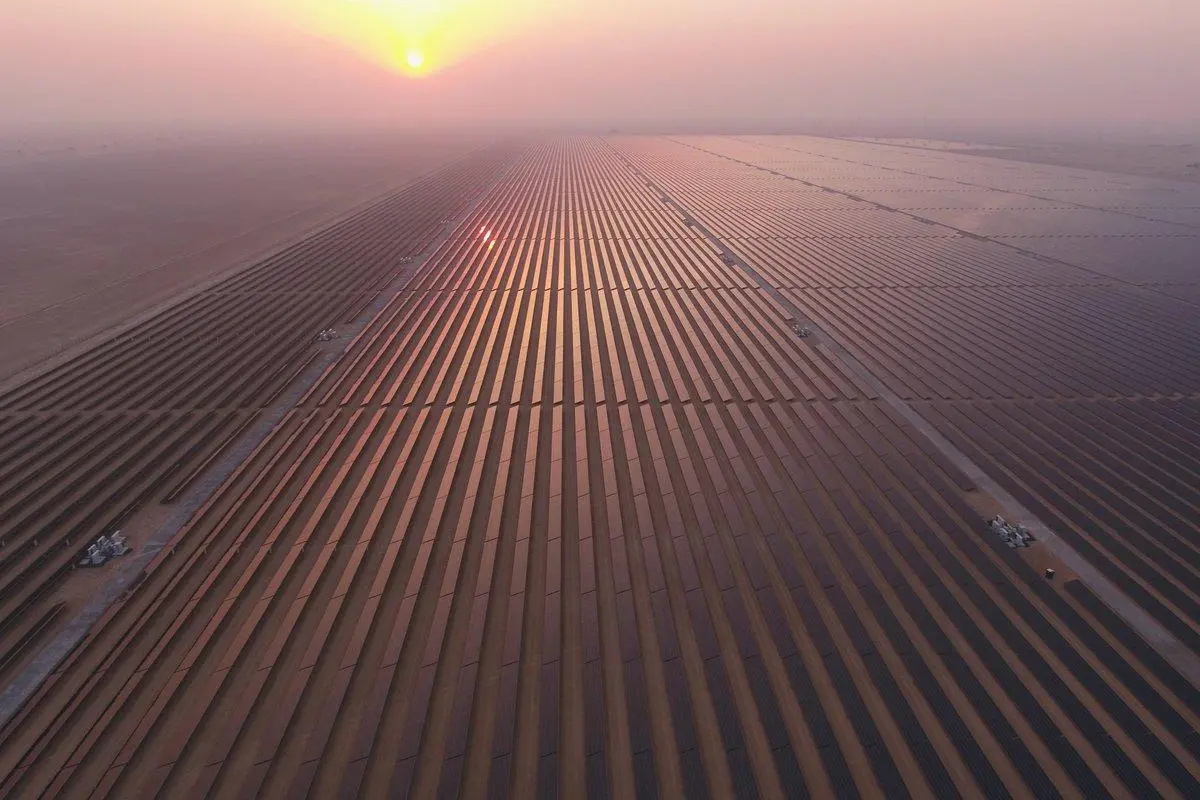PHOTO
By 2050, 50 per cent of electricity in the UAE shall be clean and emission-free, the Ministry of Climate Change and Environment (MoCCAE) said on Wednesday as it officially launched the country’s Environmental Policy, which the Cabinet approved in late November.
The UAE Environmental Policy is also aimed at cutting individual and institutional energy consumption by 40 per cent by 2030 and strengthening the country’s climate change adaptation capabilities by 2030.
The comprehensive plan aims to support the implementation of UN Sustainable Development Goals (SDGs), promote economic diversity and prosperity, and preserve ecosystems, said the MoCCAE.
Policy details laid out
The ministry on Wednesday held a virtual media briefing, explaining the details of the policy. It stands on eight main pillars: Climate change; environmental protection; air quality; food safety and security; sustainable local crop production; sustainable local livestock production; integrated waste management; and environmentally sound chemicals management.
“Each pillar identifies a host of initiatives aimed at achieving its goals,” said Dr Abdullah Belhaif Al Nuaimi, Minister of Climate Change and Environment.
“The country’s environmental efforts have included establishing a comprehensive legislative and regulatory framework, and launching multiple initiatives, programmes, and projects aimed at protecting the environment, preserving its natural resources and ensuring the sustainability of its biological diversity,” he explained.
Keeping pace with local and global developments, the Cabinet has adopted the UAE Environmental Policy, which provides an umbrella platform and a toolkit for building on the country’s achievements in environmental sustainability in the past years.
MoCCAE has developed the policy in cooperation with its strategic partners, following a detailed study of the current environmental situation in the country and the challenges expected in the future in line with the UAE Vision 2021 and the UAE Centennial 2071.
8 pillars explained
Here are the eight pillars of the policy and the priorities that fall under each of them:
1. Climate Change
> Managing emissions with a focus on reducing carbon emissions
> Increasing the share of clean energy in the total domestic energy mix to 50 per cent by 2050
> Cut individual and institutional energy consumption down by 40 per cent by 2030
> Strengthen the country’s climate change adaptation capabilities by 2030
> Develop flexible programmes and plans to enhance the capabilities of ecosystems and diverse sectors to adapt to the effects of climate change
2. Environmental Protection
> Reduce the loss of indigenous species, preserving ecosystems and their services
> Conserving habitats, managing marine and coastal protected areas
> Protecting, developing, and regulating the use of living aquatic resources
> Protecting 22 per cent of inland water areas and 20 per cent of biodiversity-rich coastal and marine areas
> Rehabilitating 80 per cent of degraded land by 2030
3. Air Quality
> The air quality pillar aligns with the objective of the National Agenda of the UAE Vision 2021 to raise the National Air Quality Index score to 90 per cent by 2021.
> It highlights the country’s efforts to improve indoor air quality that has had a positive impact on public health.
> Target: Increase the National Air Quality Index score to 100 per cent by 2040
4. Food Safety and Security
> Build the country’s credentials as a global hub for food trade
> Enhance the trust of consumers and export markets in UAE food products
> Implement the latest global technologies and systems
> Raise preparedness for food safety accidents
> Clearly define responsibilities in emergency situations to ensure the continuity of food supply
> Diversify the sources of food products
> Increase their availability at sales outlets in the country
> Target: Reach a score of 100 per cent on the Food Safety Index by 2040
> Monitor the levels of residues in food products of animal origin by 2026
> Develop the National Food Accreditation and Registration System (Zad) and the National Rapid Alert System for Food
> Standardise regulatory procedures
5-6. Sustainable Local Crop and Animal Production
> Strengthening the capacities of the local agricultural sector by adopting sustainable and climate-smart agricultural methods
> Expanding their use to increase production and boost its efficiency and safety through optimal use of resources
> Advance research of salt-tolerant and drought-tolerant species
> Implement artificial intelligence and other state-of-the-art technologies in agriculture,
> Reduce water losses during irrigation
> Protect soil from pesticide residues
> Enhance the application of organic systems.
> Raise crop productivity per land area and volume of irrigation water by 2026
> Increase urban farming by 60 per cent by 2050
> Position the country as a global hub for camel breeding research by 2040
> Achieve 100 per cent self-sufficiency in select animal products by 2040
7. Integrated Waste Management
> Focus on cutting down on waste generation at source
> Mitigate the economic, health, and environmental risks resulting from unsustainable waste treatment and disposal
> Establish the UAE as a pioneering model in the field of circular economy by turning waste-related challenges into development opportunities
> Transform waste from an environmental burden into an important economic resource
> Treat 75 per cent of municipal solid waste by 2025 and 85 per cent by 2035
> Reduce municipal solid waste generation to 1.4kg per person per day by 2025 and 1.2 kg per person per day by 2035
8. Environmentally Sound Chemicals Management
> Reinforcing the legislative and regulatory frameworks that ensure the safe use of chemicals throughout their life cycle
> Raise awareness about the dangers of inappropriate and unsafe waste handling
> Implement a set of high-level policies, measures, and practices aimed at minimizing reliance on hazardous chemicals
> Create a new market for green industries
> Increase the use of environmentally safe refrigerants to completely eliminate ozone-depleting substances by 2040
> Achieve zero accidents due to the inappropriate and unsafe use of chemicals by 2025
Copyright © 2020 Khaleej Times. All Rights Reserved. Provided by SyndiGate Media Inc. (Syndigate.info).





















